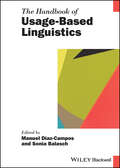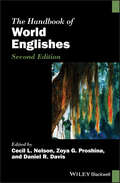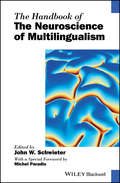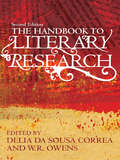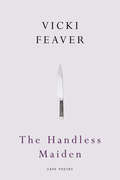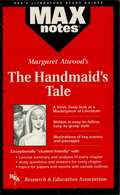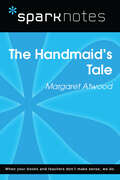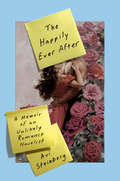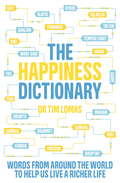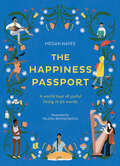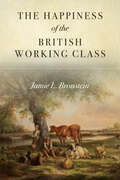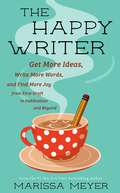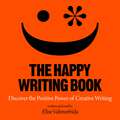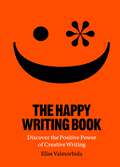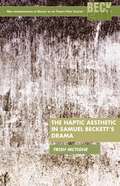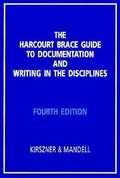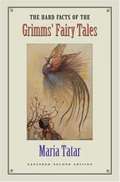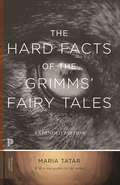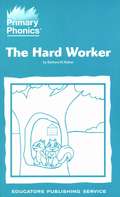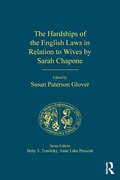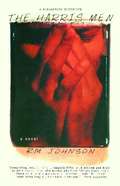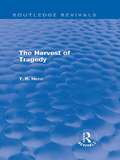- Table View
- List View
The Handbook of Usage-Based Linguistics (Blackwell Handbooks in Linguistics)
by Manuel A. Díaz‐Campos; Sonia BalaschThe Handbook of Usage-Based Linguistics The Handbook of Usage-Based Linguistics is the first edited volume to provide a comprehensive, authoritative, and interdisciplinary view of usage-based theory in linguistics. Contributions by an international team of established and emerging scholars discuss the application of used-based approaches in phonology, morphosyntax, psycholinguistics, language variation and change, language development, cognitive linguistics, and other subfields of linguistics. Unprecedented in depth and scope, this groundbreaking work of scholarship addresses all major theoretical and methodological aspects of usage-based linguistics while offering diverse perspectives and key insights into theory, history, and methodology. Throughout the text, in-depth essays explore up-to-date methodologies, emerging approaches, new technologies, and cutting-edge research in usage-based linguistics in many languages and subdisciplines. Topics include used-based approaches to subfields such as anthropological linguistics, computational linguistics, statistical analysis, and corpus linguistics. Covering the conceptual foundations, historical development, and future directions of usage-based theory, The Handbook of Usage-Based Linguistics is a must-have reference work for advanced students and scholars in anthropological linguistics, psycholinguistics, cognitive linguistics, corpora analysis, and other subfields of linguistics.
The Handbook of World Englishes (Blackwell Handbooks in Linguistics #47)
by Cecil L. Nelson Zoya G. Proshina Daniel R. DavisThe definitive reference work on World Englishes—fully revised, expanded, and updated The Handbook of World Englishes is a collection of articles on the cross-cultural and transnational linguistic convergence and change of the English language. Now in its second edition, this Handbook brings together multiple theoretical, contextual, and ideological perspectives, and offers new interpretations of the changing identities of world Englishes (WE) speakers and examines the current state of the English language across the world. Thematically integrated contributions from leading scholars and researchers explore the expansion, modification, and adaptation of English in various settings and discuss the role of English in local, regional, and global contexts. This highly regarded text has been fully updated throughout the new edition to reflect the current conditions, contexts, and functions of major varieties of English across the world. Significant revisions to topics—such as an overview of the varieties of modern world Englishes and the First Diaspora in Wales and Ireland—reflect expanded scholarship in the field and new directions of research. Each chapter from the first edition has been updated in content and citations, while 11 new chapters cover subjects including world Englishes testing and Postcolonial theory, as well as world Englishes in South America, Russia, Africa, China, Southeast Asia, the United States, and Canada. Examines both traditional and contemporary perspectives on World Englishes Written by international authors, experts in their respective fields Emphasizes the historical development of the English language through a series of diasporas Highlights research into a wide range of sociolinguistic contexts and processes including code switching, newly established WE varieties, and new data on Chinese and Russian Englishes Explores future directions in WE research, development, and application The Handbook of World Englishes is an essential resource for academics, researchers, practitioners, and advanced students in fields including applied linguistics, language teaching, the history of the English language, world literatures, and related social and language sciences.
The Handbook of the Neuroscience of Multilingualism (Blackwell Handbooks in Linguistics)
by John W. Schwieter Michel ParadisThe definitive guide to 21st century investigations of multilingual neuroscience The Handbook of the Neuroscience of Multilingualism provides a comprehensive survey of neurocognitive investigations of multiple-language speakers. Prominent scholar John W. Schwieter offers a unique collection of works from globally recognized researchers in neuroscience, psycholinguistics, neurobiology, psychology, neuroimaging, and others, to provide a multidisciplinary overview of relevant topics. Authoritative coverage of state-of-the-art research provides readers with fundamental knowledge of significant theories and methods, language impairments and disorders, and neural representations, functions, and processes of the multilingual brain. Focusing on up-to-date theoretical and experimental research, this timely handbook explores new directions of study and examines significant findings in the rapidly evolving field of multilingual neuroscience. Discussions on the bilingual advantage debate, recovery and rehabilitation patterns in multilingual aphasia, and the neurocognitive effects of multilingualism throughout the lifespan allow informed investigation of contemporary issues. Presents the first handbook-length examination of the neuroscience and neurolinguistics of multilingualism Demonstrates how neuroscience and multilingualism intersect several areas of research, such as neurobiology and experimental psychology Includes works from prominent international scholars and researchers to provide global perspective Reflects cutting-edge research and promising areas of future study in the dynamic field of multilingual neuroscience The Handbook of the Neuroscience of Multilingualism is an invaluable resource for researchers and scholars in areas including multilingualism, psycholinguistics, second language acquisition, and cognitive science. This versatile work is also an indispensable addition to the classroom, providing advanced undergraduate and graduate students a thorough overview of the field.
The Handbook to Literary Research
by W. R. Owens Delia da Sousa CorreaThe Handbook to Literary Research is a practical guide for students embarking on postgraduate work in Literary Studies. It introduces and explains research techniques, methodologies and approaches to information resources, paying careful attention to the differences between countries and institutions, and providing a range of key examples. This fully updated second edition is divided into five sections which cover: tools of the trade – a brand new chapter outlining how to make the most of literary resources textual scholarship and book history – explains key concepts and variations in editing, publishing and bibliography issues and approaches in literary research – presents a critical overview of theoretical approaches essential to literary studies the dissertation – demonstrates how to approach, plan and write this important research exercise glossary – provides comprehensive explanations of key terms, and a checklist of resources. Packed with useful tips and exercises and written by scholars with extensive experience as teachers and researchers in the field, this volume is the ideal Handbook for those beginning postgraduate research in literature.
The Handless Maiden
by Vicki FeaverThe poems in this extraordinary book deal in familiar emotions - love, grief, rage, loneliness - but do so with such a fresh and fierce eye, such lived intensity, that the familiar is given again the force to touch our nerves, to seem raw and new. Some of the poems are based in the territory of home and childhood, others move into that unnerving space where the safe and polite world plunges over a ledge - into anarchic revisions of what is possible or acceptable. They treat myths and fairy stories, or even paintings, not as fictions but as part of our continuing experience. Powerful and sensuous, wry and witty, their clear voice stays in the mind: provoking, questioning, refusing to accept the soft lie. These disturbing and passionate poems demand to be read.
The Handmaid's Tale (Maxnotes Literature Guides)
by Malcolm FosterREA's MAXnotes for Margaret Atwood's The Handmaid's Tale MAXnotes offer a fresh look at masterpieces of literature, presented in a lively and interesting fashion. Written by literary experts who currently teach the subject, MAXnotes will enhance your understanding and enjoyment of the work. MAXnotes are designed to stimulate independent thought about the literary work by raising various issues and thought-provoking ideas and questions. MAXnotes cover the essentials of what one should know about each work, including an overall summary, character lists, an explanation and discussion of the plot, the work's historical context, illustrations to convey the mood of the work, and a biography of the author. Each chapter is individually summarized and analyzed, and has study questions and answers.
The Handmaid's Tale (SparkNotes Literature Guide Series)
by SparkNotesThe Handmaid's Tale (SparkNotes Literature Guide) by Margaret Atwood Making the reading experience fun! Created by Harvard students for students everywhere, SparkNotes is a new breed of study guide: smarter, better, faster.Geared to what today's students need to know, SparkNotes provides:chapter-by-chapter analysis explanations of key themes, motifs, and symbols a review quiz and essay topics Lively and accessible, these guides are perfect for late-night studying and writing papers.
The Hangman's Row Enquiry
by Ann PurserA new series and a new sleuth from Ann Purser-author of the Lois Meade mysteries! Ivy Beasley, the beloved cantankerous spinster from the Lois Meade mysteries, has found a silver lining in her golden years as an amateur sleuth. She teams up with Gus, a mysterious newcomer to the small English village of Barrington who can't resist a little excitement even as he strives to keep his past a secret, and her own cousin, a widow with time on her hands and money in her purse. Together they're determined to solve the murder of Gus's elderly neighbor.
The Happily Ever After: A Memoir of an Unlikely Romance Novelist
by Avi SteinbergA journalist's journey through the lands of popular romance lit and a soulful and hilarious memoir about writing a novel about searching for loveIs romance dead? Is that why there are so many vampires in today's romance novels? When Avi Steinberg's love life took a grim turn, he did what he always does: He consulted his old books, the usual cast of Great (Very Serious, Usually Male) Authors. And he immediately realized that these books were part of the problem. Instead, he began to read romances, the books he--like so many of us--have been conditioned to dismiss as "trashy." What he discovered was a genre that was tremendously diverse and daring, along with a vast network of innovative writers who were keeping the novel as alive as ever. His own relationship problems, he realized, came down to a failure of his imagination. And so he set out on a quest to write and publish a romance novel and to find real-life love.A hybrid of memoir, travelogue, and critical essay, The Happily Ever After chronicles an adventure in a brave new world of literature. Steinberg offers a report from the trenches of romance, moving between major industry conferences and writing groups at the local bar as he works and reworks his romance novel idea. He reveals the inside scoop from a major romance publishing house, crisscrosses the country meeting mysterious ghostwriters and Fabio's great unsung rival, and offers a running take on the fascinating history of romance writing, the genre that invented, and continues to reinvent, the modern novel. Along the way he meets many readers, each of whom sheds light on why we are so fascinated by--and phobic of--romance fiction and what the vitality and fractiousness of our biggest genre says about us.With quirky wit and disarming honesty, Steinberg captures an often misunderstood literary culture and learns, from its devoted practitioners, how to take the Happily Ever After seriously in his own life.
The Happiness Dictionary: Words from Around the World to Help Us Lead a Richer Life
by Dr Tim Lomas'A delightful compendium' - Evening StandardHave you ever had a feeling that you couldn't quite describe, because no English word exists for it?Indeed, without such a word, it's difficult to remember or understand the feeling, and to talk about it with other people. This applies to all aspects of life, but most of all that most sought-after of feelings, happiness, where our ability to both experience and understand it is limited by the words at our disposal. However, all is not lost. Even if English has not created a word for a specific feeling, another language probably has. These are known as 'untranslatable' words, because they lack an exact equivalent in another language. By discovering and learning these words, the boundaries of our world expand accordingly. These words allow us to give voice to feelings that we've probably experienced, but have previously lacked the ability to conceptualise. They may even allow us to encounter new feelings that we hadn't previously been aware of or enjoyed.This book will introduce you to a wealth of untranslatable words relating to happiness, from languages across the world. Reading it will enrich not just your understanding of happiness, but also the way that you experience it.
The Happiness Passport: A World Tour of Joyful Living in 50 Words
by Megan HayesFifty words from cultures around the world that capture the secrets of living well, from craic to yang sheng and hygge to ubuntu: “A pure joy to read.” —FlowMagazineThe Happiness Passport is a collection of wonderfully evocative words from around the globe whose definitions resonate with us all. Though the words themselves often seem untranslatable, the meaning behind each expression will stir up familiar emotions—bringing joy, contentment, and a greater understanding of other cultures. There are a wealth of examples to discover for a more wholesome outlook on life, including: • Hiraeth—the word for deep longing for home (Welsh)• Goya—the transportive ability of good storytelling (Urdu)• Yugen—the ability of the natural world to deeply move us (Japanese)• Gigil—the overwhelming urge to cuddle an adorable pet (Philippine Tagalog)This treasure trove of delights examines the cultural context of each expression and the lessons that we can apply in our own lives to achieve greater contentment, with beautiful original illustrations that evoke each elusive expression.“[Hayes] joins the dots between these differing beliefs to help us cultivate a richer shared vocabulary of happiness, and unravels the global interpretations of living well and contentedly.” —Psychologies Magazine
The Happiness of the British Working Class
by Jamie L. BronsteinFor working-class life writers in nineteenth century Britain, happiness was a multifaceted emotion: a concept that could describe experiences of hedonic pleasure, foster and deepen social relationships, drive individuals to self-improvement, and lead them to look back over their lives and evaluate whether they were well-lived. However, not all working-class autobiographers shared the same concepts or valorizations of happiness, as variables such as geography, gender, political affiliation, and social and economic mobility often influenced the way they defined and experienced their emotional lives. The Happiness of the British Working Class employs and analyzes over 350 autobiographies of individuals in England, Scotland, and Ireland to explore the sources of happiness of British working people born before 1870. Drawing from careful examinations of their personal narratives, Jamie L. Bronstein investigates the ways in which working people thought about the good life as seen through their experiences with family and friends, rewarding work, interaction with the natural world, science and creativity, political causes and religious commitments, and physical and economic struggles. Informed by the history of emotions and the philosophical and social-scientific literature on happiness, this book reflects broadly on the industrial-era working-class experience in an era of immense social and economic change.
The Happy Writer: Get More Ideas, Write More Words, and Find More Joy from First Draft to Publication and Beyond
by Marissa MeyerFrom #1 New York Times bestselling author and the creator and host of the popular podcast, The Happy Writer, comes the ultimate guide to writing with less stress and more JOY.If you aren’t suffering, you aren’t creating. Right? Wrong! Writing can and should be joyful, fulfilling… even fun! Applicable to writers in all genres and disciplines—from screenwriters to novelists, journalists to picture book authors, aspiring to many-times published—The Happy Writer is a heartfelt and optimistic guide that will show you the way to a happier writing journey.Part craft guide, part writing coach, and part cheerleader, this book offers useful advice on a slew of common writing and publishing ailments, such as how to end procrastination, how to build a social media platform that reflects your personality, how to get your imagination to overflow with new ideas, how to listen to your intuition when receiving a critique on your work, how to overcome impostor syndrome, what to do when you’re stuck in the query trenches, and so much more.No matter where a writer might be on their creative journey, Meyer encourages them to tap into their own personal sources of joy and to celebrate every milestone, all while confronting challenges (writer’s block! rejection! burnout!) with a reservoir of resources for every temperament, budget, and career.Known in writers’ circles as a generous mentor, Meyer shares stories from her own writing path to help every writer discover the ultimate joys of living their best writing life.
The Happy Writing Book: Discover the Positive Power of Creative Writing
by Elise Valmorbida'There are many guides to good writing but none as valuable as this.' Oliver Kamm, author and columnist for The TimesCreative writing can enhance wellbeing, which can enhance creative writing, which can enhance wellbeing ... Become a better writer with over 100 inspiring prompts, insights and exercises specially devised by an award-winning author and creative writing teacher. Discover how the practice of creative writing - being expressive, exploring ideas, crafting words, shaping stories - can also deepen your appreciation of life.
The Happy Writing Book: Discover the Positive Power of Creative Writing
by Elise Valmorbida'There are many guides to good writing but none as valuable as this.' Oliver Kamm, author and columnist for The TimesCreative writing can enhance wellbeing, which can enhance creative writing, which can enhance wellbeing ... Become a better writer with over 100 inspiring prompts, insights and exercises specially devised by an award-winning author and creative writing teacher. Discover how the practice of creative writing - being expressive, exploring ideas, crafting words, shaping stories - can also deepen your appreciation of life.
The Happy Writing Book: Discover the Positive Power of Creative Writing
by Elise Valmorbida'There are many guides to good writing but none as valuable as this.' Oliver Kamm, author and columnist for The TimesCreative writing can enhance wellbeing, which can enhance creative writing, which can enhance wellbeing ... Become a better writer with over 100 inspiring prompts, insights and exercises specially devised by an award-winning author and creative writing teacher. Discover how the practice of creative writing - being expressive, exploring ideas, crafting words, shaping stories - can also deepen your appreciation of life.
The Haptic Aesthetic in Samuel Beckett’s Drama (New Interpretations of Beckett in the 21st Century)
by Trish McTigheSamuel Beckett's work is deeply concerned with physical contact - remembered, half-remembered, or imagined. Applying the philosophical writings of Jean-Luc Nancy and Maurice Merleau-Ponty that feature sensation, this study examines how Beckett's later work dramatizes moments of contact between self and self, self and world, and self and other.
The Harcourt Brace Guide to Documentation and Writing in the Disciplines (4th edition)
by Laurie G. Kirszner Stephen R. MandellPreparing to write for research; developing an argument; writing in the humanities, social sciences, natural sciences, and business; overview of documentation styles for books and articles
The Hard Facts of the Grimms' Fairy Tales (expanded 2nd edition)
by Maria TatarThe history of the Grimms' fairy tales, with criticism and interpretation. Includes translations of 6 fairy tales, commentaries on them, bibliographical references and index.
The Hard Facts of the Grimms' Fairy Tales: Expanded Edition (Princeton Classics Series #39)
by Maria TatarMurder, mutilation, cannibalism, infanticide, and incest: the darker side of classic fairy tales is the subject of this groundbreaking and intriguing study of Jacob and Wilhelm Grimm’s Nursery and Household Tales. This expanded edition includes a new preface and an appendix featuring translations of six tales with commentary by Maria Tatar. Throughout the book, Tatar draws on the disciplinary tools of psychoanalysis and folklore while also providing historical context to explore the harsher aspects of these stories, presenting new interpretations of tales that engage in a kind of cultural repetition compulsion. No other book so thoroughly challenges us to rethink the happily-ever-after of these classic stories.
The Hardships of the English Laws in Relation to Wives by Sarah Chapone (The Early Modern Englishwoman, 1500-1750: Contemporary Editions)
by Susan Paterson GloverSusan Paterson Glover here presents, in modern type, a critical edition of the first printed work by an English woman writer, Sarah Chapone, on the inequity of the common law regime for married women. Glover's extended, original introduction provides an account of Chapone's life; a discussion of the influence of Mary Astell's work on Chapone's thought and work; and a review of the legal status of women in England's eighteenth century, with particular attention to marriage and the doctrine of coverture and the relations of women, law, and property. It concludes by acknowledging the importance of this text to any consideration of the evolution of a discourse of "rights" for women in the Anglo–American legal tradition, and its contribution to a movement for property rights and women's equality whose genesis is generally located in the legislative changes of the nineteenth century. The edition contains valuable appendices including, among other writings, excerpts from Chapone's correspondence with Samuel Richardson; excerpts of responses to Chapone's work from the Weekly Miscellany; and excerpts from contemporary legal literature. Also included is an annotated text of Chapone's pamphlet on the Muilman controversy, Remarks on Mrs. Muilman's Letter to the Right Honourable The Earl of Chesterfield (London, 1750).
The Harris Men
by Rm JohnsonRM Johnson's extraordinary debut is a stirring family portrait that resonates with emotion and wit, as a father faces death -- and the three sons he abandoned so many years before. "Mr. Harris, I'm sorry, but you have cancer." Although devastated to learn he has just one year to live, fifty-five-year-old Julius Harris has always known that the day would come when he would pay for walking out on his wife and three children twenty years earlier. Now, with a sudden and passionate determination to make his family whole again, Julius begins trying to find a way back to his sons. Caleb, the youngest, struggling to support a son and make his way in a relentless world, couldn't care less about his own absentee father. Middle son Marcus can't abide even his father's memory, which gets in the way of his committing to the one woman who has turned his life around. And Austin, Julius' eldest child, so adores what he remembers of his father that he's following in his footsteps, abandoning his wife and children just as Julius had done. Inspired by RM Johnson's own fragile family history, The Harris Men is his poignant exploration of the increasing problem of absentee fathers -- and of the compromises made by the families they leave behind. As the Harris men grapple with their fears and their choices, Johnson gets to the very heart of what it means to be a man.
The Haruki Phenomenon: Haruki Murakami as Cosmopolitan Writer
by Tomoki WakatsukiThis book explores the idea of a new cosmopolitan Japanese identity through a socio-cultural analysis of contemporary Japanese writer Haruki Murakami. It is the first monograph to apply the idea of cosmopolitanism to this writer’s global popularity widely known as the “Haruki phenomenon”.By pioneering an enquiry into Murakami’s cosmopolitanism, this book aims to overcome the prevailing myth of “Japaneseness”(Nihonjinron) as a form of self-identification for Japanese, and propose an alternative approach for contemplating contemporary Japanese cultural identity. Socio-cultural analysis of this author and his works shall establish Murakami’s cosmopolitan qualities and how they contribute to the cultural phenomenon of globalization. Furthermore, this book will introduce the idea of “everyday cosmopolitanism” as a relevant concept to address an emergent global cultural sphere. Unlike the traditional model of cosmopolitanism, which is sometimes regarded as idealist and elitist, “everyday cosmopolitanism” encompasses the everyday spheres of ordinary people. Tomoki Wakatsuki argues that the Haruki phenomenon, as a global and local event, echoes this important social trend today. Murakami’s departure from conventional notions of Japanese identity offers an alternative perception of identity and belonging that is useful for situating Japanese identity within a global context. This text will be of interest to students and scholars of cultural studies, global literature, contemporary Japanese literature, cultural cosmopolitanism and the global cultural sphere.
The Harvest of Tragedy (Routledge Revivals)
by Thomas Rice HennUpon initial publication in 1956, this book was an attempt to re-state certain problems concerning the aesthetics and ethics of the tragic form; to examine these in relation to contemporary work in psychology and anthropology; to enquire into the significance of ‘the fact or experience called tragedy’ in the modern world; and to suggest a synthesis in terms of the Christian tradition. This is a reissue of the corrected second edition of the work, first published in 1966.
